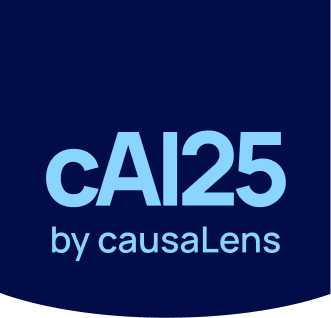Category: Stream 1
In conversation with Tony Jebara, VP of Personalization & Head of AI at Spotify
Join us for a discussion with Tony Jebara, VP of Personalization and Head of AI at Spotify, where he leads the machine learning strategy behind one of the world’s most sophisticated consumer platforms. With over 20 years in AI and machine learning, Tony’s experience spans Spotify, Netflix, academia, and AI entrepreneurship. He’s authored 100+ research papers with 20,000+ citations and built ML systems that serve hundreds of millions daily.
-
 Tony Jebara VP of Engineering, Head of AI/ML, Spotify
Tony Jebara VP of Engineering, Head of AI/ML, Spotify
The Next Era of Creative Effectiveness: Measuring Brand Endurance with Data Science Agents
We’ll explore how McCann is partnering with causaLens and leveraging Causal AI agents to overcome data complexity, automate modelling, and democratise insight generation — making it possible to measure and scale brand endurance across clients and categories. Discover how AI data science agents are enabling strategic scenario planning and creative effectiveness at scale.
-
 Annie Hou SVP - Global Head of Data & AI, McCann Worldgroup
Annie Hou SVP - Global Head of Data & AI, McCann Worldgroup -
 Haydn Russell Group Research Director , McCann
Haydn Russell Group Research Director , McCann
Scaling Marketing Science with AI Agents
In this session, Puneeth Nikin, Head of Data Science at Croud, shares how AI agents are transforming the pace and productivity of marketing analytics. From automating time-consuming data prep to enabling real-time insight generation, agents are helping teams scale faster without sacrificing quality. Learn how Croud is using custom agents to reduce dependency on freelance resourcing, unlock higher-value work for in-house talent, and democratize access to data science across the organization. This fireside chat offers a forward-looking view on how agencies can orchestrate entire workflows with AI—boosting speed, precision, and strategic impact.
-
 Puneeth Nikin Head of Data Science, Croud
Puneeth Nikin Head of Data Science, Croud
Causality, AI Agents, and the Future of Data Science: A Fireside Chat with Guido Imbens
In this wide-ranging conversation, Nobel Prize-winning economist Guido Imbens reflects on the future of data science, AI agents, and causal reasoning. From the challenges of applying causality in real-world workflows to the role of human judgment in increasingly automated systems, Guido shares timely perspectives on how to make data science more rigorous, trustworthy, and impactful. The session will explore how AI agents may reshape the field, what the industry often gets wrong, and why bridging the gap between academic insight and enterprise application is essential for building the next generation of intelligent, evidence-based systems.
-
 Guido Imbens Nobel Prize Laurette , Professor at Stanford
Guido Imbens Nobel Prize Laurette , Professor at Stanford
AI Agents on the Edge: Unlocking the Next Frontier of Intelligent Computing
As AI enters a new era, the next frontier isn’t in the cloud—it’s at the edge. In this fireside chat, Qualcomm’s Luiz Tonisi joins causaLens CEO Darko Matovski to explore how AI agents running at the edge are reshaping the future of enterprise intelligence. From on-device decision-making and ultra-low-latency inference to real-time vision applications and autonomous drones, this conversation covers cutting-edge use cases already underway in sectors like energy, manufacturing, and agriculture.
They’ll also discuss the implications of a world where the agent becomes the new UI, the evolving balance between cloud and edge, and how their partnership is enabling organizations to bypass traditional AI tooling—bringing intelligent agents directly to the data, wherever it lives.
Get ready for a deep dive into a fast-approaching future where AI agents don’t just assist—they act.
-
 Luiz Tonisi President Latam , Qualcomm
Luiz Tonisi President Latam , Qualcomm
Accelerating Innovation in Drug Manufacturing with Causality
Dr. Juan Carlos Araque, Principal Scientist at Johnson & Johnson, is a leader in Process Science and Modeling in pharmaceutical manufacturing. His work demonstrates how Causal AI can streamline the production of critical therapies.
In his talk, Juan will explore how Causal Inference is transforming the future of pharma, driving advancements in manufacturing efficiency and quality, for instance. With his expertise at the intersection of Causal AI and pharmaceutical science, Juan’s session offers a compelling vision for the industry, making his session essential for anyone eager to explore the transformative power of Causality
-
 Juan Carlos Araque Principal Scientist, Process Science and Modeling, Johnson & Johnson Innovative Medicine
Juan Carlos Araque Principal Scientist, Process Science and Modeling, Johnson & Johnson Innovative Medicine
Optimizing Pharma Engagement with Causal AI-powered AI Agents for Precision Impact
This session explores how Causal AI transforms pharma engagement by moving beyond traditional attribution models to measure true causal impact. It highlights how Syneos, in collaboration with CausaLens, applies causal inference to drive precision engagement in pharma and explores the future of continuous optimization powered by AI. The discussion will also cover how AI agents automate resource allocation and next-best-action recommendations, shifting from retrospective analysis to real-time decision-making.
-
 Bharathi Ramachandran Director, Data Science, Syneos Health
Bharathi Ramachandran Director, Data Science, Syneos Health -
 Adam Cahill General Manager, Kinetic , Syneos Health
Adam Cahill General Manager, Kinetic , Syneos Health
Democratizing Data Science and Scaling Smarter Decisions with AI Agents
In this high-impact fireside chat, Vince Iswara, CEO of DANA Indonesia—a digital finance leader serving over 200 million users—joins causaLens founder Darko Matovski to explore how AI agents are transforming enterprise decision-making in one of the fastest-growing economies in the world.
Learn how DANA became one of the first fintech companies to operationalize AI agents across fraud prevention, customer support, marketing, onboarding, and more. Vince will share how this shift has democratized data access, enabled a data citizen culture, and empowered teams to experiment faster, make smarter decisions, and unlock real business value—augmenting rather than replacing human teams.
A candid, future-looking conversation on what it takes to scale AI agent adoption in high-growth environments—and what it means for the future of financial services.
-
 Vince Iswara CEO, DANA Indonesia
Vince Iswara CEO, DANA Indonesia
Revolutionizing Demand Forecasting and its Enterprise Impact using Causal AI and Agents
Cisco’s use of Causal AI is revolutionizing its Demand Forecasting practice from Enterprise Business Entity Level forecasts to Regional and Sales Segment Level Forecasts to Product and SKU level forecasts, enabling better decisions in many areas of the enterprise. Our Supply Chain Global Planning teams are building trust and confidence by challenging the recency bias in current forecasting approaches and producing evidence-based insights that build trust and confidence.
Efficiently developing and scaling this practice to increase business relevance with stakeholders while improving model confidence and forecast accuracy, has seemed like a bridge too far. Could agentification be the answer? This talk will bring out some of the real-world challenges facing Data Scientists in my team and where reliable agentification can provide the breakthroughs needed to turn a seemingly insurmountable challenge into a streamlined and scalable, insight-rich process that delivers higher quality models and drives tangible business outcomes.
-
 Puneet Gupta Director, Data Science, Global Planning, Cisco
Puneet Gupta Director, Data Science, Global Planning, Cisco
causaLens: AI Agents Revolutionising Data Science
Kicking off the cAI Data Science Conference, causaLens CEO and founder Darko Matovski will explore how AI agents are redefining the data science function—from automating workflows to enabling truly autonomous decision-making.
This opening keynote will set the stage for a day of groundbreaking insights, practical applications, and bold ideas shaping the future of AI in the enterprise.
-
 Darko Matovski Founding CEO, causaLens
Darko Matovski Founding CEO, causaLens
